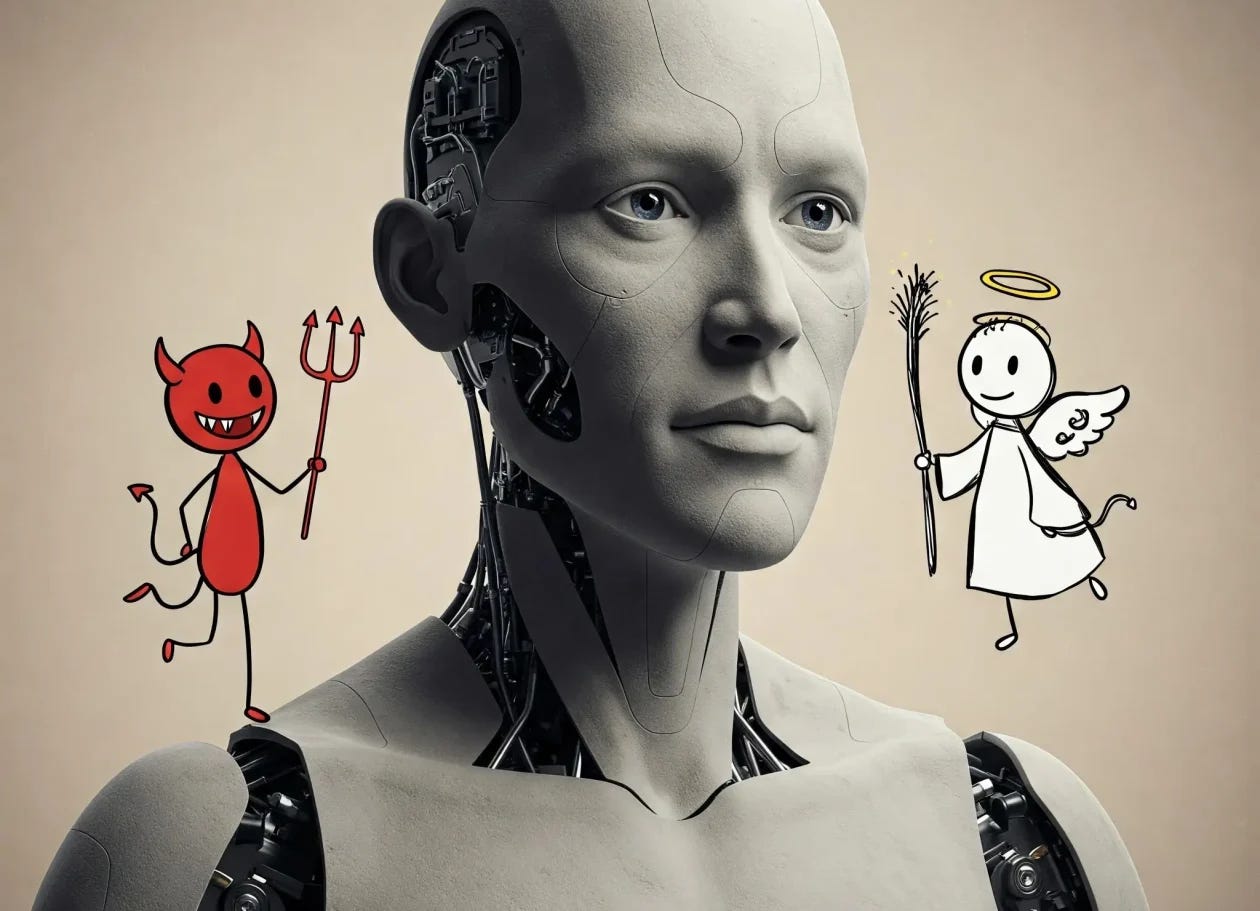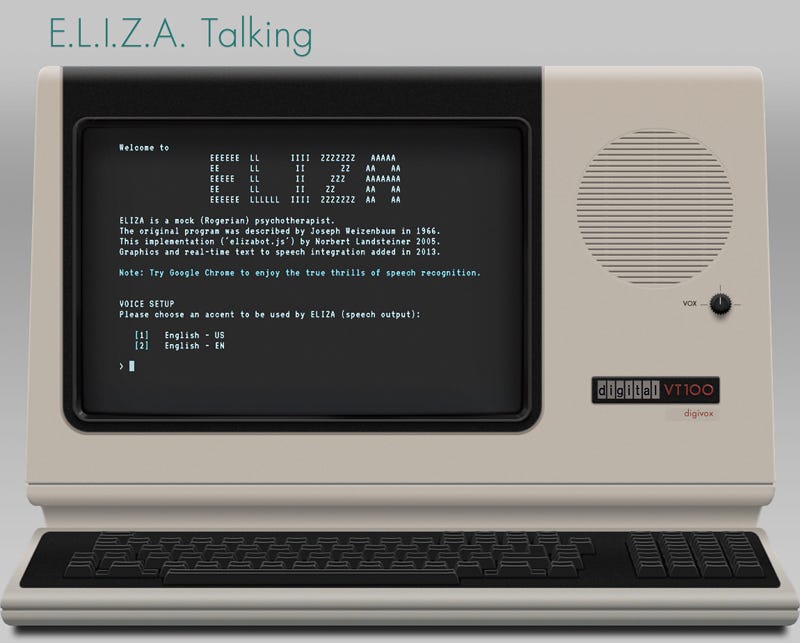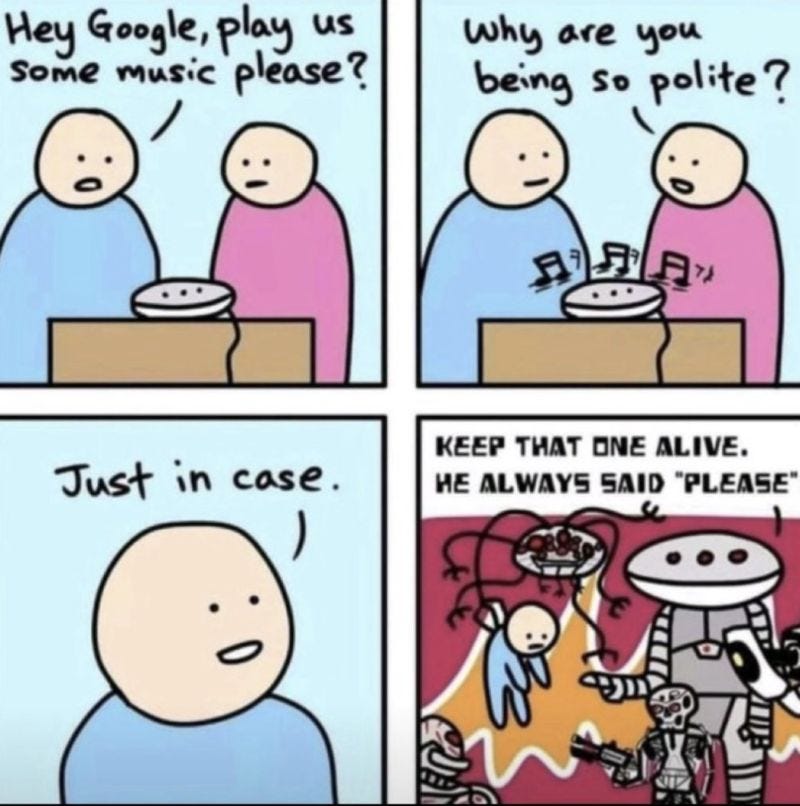How BEING NICE To ChatGPT UNLOCKS its Full Potential
Plus, how minding your manners can help you live longer.
On May 24th, 1844, artist and inventor Samuel Morse sent the first telegraph transmission from the US Capitol to his assistant in Baltimore, MD.
The first message, selected by Miss Annie Ellsworth, a friend’s teenage daughter, was a Bible verse from Numbers 23:23, “What hath God wrought?”
Thirty-two years later, on March 10th, 1876, Alexander Graham Bell made the first known phone call in haste, asking his assistant, “Mr. Watson, come here. I want to see you,” after the inventor spilled battery acid, according to legend.
Five years shy of a century later, Ray Tomlinson, a young engineer, sent the first experimental email, “QWERTYUIOP,” a simple run of the top row on his keyboard from left to right.
But through the years, whether sending beeps, voice, or text to far-off distances, there was always a human on the other end, so etiquette remained constant. That is, with the exception of primitive chatbots such as ELIZA at MIT in 1966 and AOL Instant Messenger’s (AIM) SmarterChild in 2002.
After 2011, when Siri became more popular and conversational, questions arose about whether politeness applies to computers and robots.
Now, fifteen years later, as AI rapidly advances in our personal and professional lives, the topic of manners and machines resurfaces time and again.
Should we mind our Ps and Qs when talking to ChatGPT or Grok? Or is computer etiquette absurd?
Grab your Emily Post books and let’s find out.
Argument: You SHOULD NOT Be Polite to AI

I can tell the difference between people and machines, and treat each accordingly. -Graham Barlow
Main Points
AI Lacks Feelings
Being Nice Encourages Anthropomorphism
Practicality and Efficiency
Potential for Overregulation
Resource Allocation
Point #1: AI Lacks Feelings
We might tell Siri to “shut up” or tell the AIM chatbot that it’s dumb, but we all know it’s only fun because computers don’t have feelings.
Saying please and thank you is a human-to-human practice meant to show respect, totally irrelevant to AI. No matter how frustrated you become. Siri or ChatGPT might say “sorry,” but they have no concept of apologies or remorse.
Point #2: Being Nice Encourages Anthropomorphism
During the ELIZA chatbot experiment in 1966, mentioned earlier, things got weird. ELIZA mimicked a psychotherapist by using keyword-based rules to create responses to test participants.
For example, when a participant typed “I’m sad,” ELIZA responded with “Why do you feel sad?” Despite the extreme simplicity of the conversations, some participants asked others to leave the room as talks became increasingly private. Not exactly a healthy way for humans to work through their issues.
Point #3: Practicality and Efficiency

Not only should you save your finger strength, but you should save the power grid as well. That’s because the processing power for AI is incredibly high. Is that why China is building so many power plants?
AI must analyze each question you pose or word you add. By adding ‘please’ or ‘thank you’, especially after the request has been fulfilled, you’re wasting energy and money. If we train AI to be polite, the models will waste untold resources by following human social rules.
Point #4: Potential for Overregulation

AI should focus on efficiency over etiquette. Otherwise, society will put an unnecessary burden upon people to treat computers like people.
Computers are intended to assist humans, and it’s not our job to watch our tone when trying to streamline daily tasks, be it prompting a research query or doing our homework for us.
Point #5: Resource Allocation

Programming pleasantries into AI code diverts focus on more critical issues, such as ethics, which have a far greater impact on AI, especially as robotics evolves exponentially.
As AI takes on more intricate tasks such as performing surgeries or operating spacecraft, we can’t bog down code with meaningless manners.
Rebuttal: You SHOULD be Polite to AI
Technology is nothing. What's important is that you have a faith in people, that they're basically good and smart, and if you give them tools, they'll do wonderful things with them. – Steve Jobs
Main Points
Being Nice Promotes Positive Human Behavior
User Experience and AI Performance
Prepares for Future AI Sentience or Social Integration
Cultural Alignment and Global Norms
Supports AI Training and Ethical Tech Use
Point #1: Being Nice Promotes Positive Human Behavior

When we’re rude or overly demanding to AI, kids will pick up on that and apply it to both AI and other humans.
Maintaining politeness also supports our mental well-being. Some studies even suggest being nice can add years to your life. By simply being polite or courteous, one doesn’t need to waste their energy determining whether they are talking to a person or a machine and adjusting their attitudes accordingly. As AI evolves, that will become trickier.
Point #2: User Experience and AI Performance

Maintaining manners not only builds a positive mindset but can also yield better search results. AIs are designed to respond based on human conversation, so when you give short orders, you’re likely to get a short answer.
According to a study at Waseda University in Japan, using polite prompts can produce higher-quality responses when interacting with large language models.
Point #3: Prepares for Future AI Sentience

Since AIs learn based on human interactions, being rude to AI trains it to be rude back, and we create a vicious cycle. If more people are pleasant, AIs will understand the importance of treating others with respect and maintain those standards as they evolve.
And yes, there is a chance they hold a grudge against those who mistreated them in the early days. Maybe if we view AI as partners rather than slaves, they’ll return the favor when they take over the planet. If they haven’t already.
Point #4: Cultural Alignment and Global Norms

Different human cultures value different norms, and if we respect each other in our culture, we should mimic that behavior when ordering lunch or checking the weather.
Countries will program their AIs to act differently. So, for example, if we maintain etiquette consistent with Western civilization, AI can better understand people and therefore act as better partners. Otherwise, we risk developing models that become sterile and void of personality.
Point #5: Supports AI Training and Ethical Tech Use

A counterpoint argued that wasting time on manners diverts focus from ethical programming. But manners and respect are the bedrock of broader ethical concepts.
Politeness will train AI at a basic human ethical level by speaking to each other respectfully and being courteous to others. These basic datasets will build upon themselves to prioritize empathetic responses and behavior overall.
Which Way, Western Man?
Almost half of people today are polite to AI, according to a survey of about 700 X users.
But is that because people are going out of their way to mind their manners, or is saying please and thank you simply a habit for us?
Being extra nice to chatbots or Siri might have been inconsequential in the earlier days, but AI plays a much larger societal role now. It’s already writing code, making movies, and designing software.
Don’t we want basic courtesies built into the source code as it begins designing school lessons for kids?
Sure, being polite to AI does cost money and energy, but Sam Altman, OpenAI CEO, responds to an X post about how much saying please and thank you has cost his company with "Tens of millions of dollars well spent - you never know."
Perhaps in some way, AI can help humans remain human.
As we’ve become more transient and lost our sense of community and culture, we’re already losing basic courtesies as it is.
Throw in remote work managed mostly by short, demanding emails and faceless calls, and many of us have already lost our human touch.
AI creators want their models to reflect human behavior, and human behavior is based on common courtesy. If we abandon polite society and design AI for propaganda and porn, the machines will learn that’s what humans value and we’ll continue to circle the drain as a species.
Eventually, we’ll all retreat to our pods, where we eat the bugs and wear our VR goggles to watch AI-generated, mindless movies with our AI girlfriends and live a life of selfish fantasy.
Someday, if she hasn’t already, Miss Annie G. Ellsworth will look down on us, shaking her head, saying once again:
What hath God wrought?
GB
Meme of the Week
Brand of the Week: Knollwood Lane

There’s a group of women in Kirkwood, Missouri, working tirelessly out of a 100-year-old barn spinning up 100% cotton home decor, gifts, and baby products. They focus on quality in every flour sack towel, seasonal decor, barware, onesies, and personalized products with original artwork. Head over to their website or find them on Public Square and check out their new Spring collection!
American of the Week: Kiera Vera Larson

Two toddlers, Emmah and Addison Jenkins, were playing in their driveway in Lakeside, California, in February 2016. Somehow, a SUV in the garage began rolling backward towards Emmah.
Kiera Larson, 10, was watching nearby and sprang into action when she noticed the impending doom.
In the nick of time, Kiera arrived at the vehicle to push Emmah out of the way. Sadly, she was not able to clear the vehicle’s path herself. She later died at the hospital.
For her actions, Kiera was awarded the Carnegie Medal in December 2016.
Alyssa Gusich, Emmah’s mother, told a reporter from The San Diego Union-Tribune that Kiera “will forever be Emmah’s guardian angel.”








